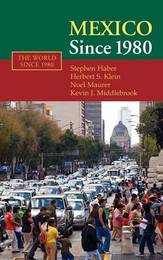
|
Mexico since 1980
Hardback
Main Details
| Title |
Mexico since 1980
|
| Authors and Contributors |
By (author) Stephen Haber
|
|
By (author) Herbert S. Klein
|
|
By (author) Noel Maurer
|
|
By (author) Kevin J. Middlebrook
|
| Series | The World Since 1980 |
|---|
| Physical Properties |
| Format:Hardback | | Pages:266 | | Dimensions(mm): Height 221,Width 152 |
|
| ISBN/Barcode |
9780521846417
|
| Classifications | Dewey:972.083 |
|---|
| Audience | | Tertiary Education (US: College) | | Professional & Vocational | |
|---|
| Illustrations |
41 Line drawings, unspecified
|
|
Publishing Details |
| Publisher |
Cambridge University Press
|
| Imprint |
Cambridge University Press
|
| Publication Date |
4 August 2008 |
| Publication Country |
United Kingdom
|
Description
This book addresses two questions that are crucial to understanding Mexico's current economic and political challenges. Why did the opening up of the economy to foreign trade and investment not result in sustained economic growth? Why has electoral democracy not produced rule of law? The answer to those questions lies in the ways in which Mexico's long history with authoritarian government shaped its judicial, taxation, and property rights institutions. These institutions, the authors argue, cannot be reformed with the stroke of a pen. Moreover, they represent powerful constraints on the ability of the Mexican government to fund welfare-enhancing reforms, on the ability of firms and households to write contracts, and on the ability of citizens to enforce their basic rights.
Author Biography
Stephen Haber is Peter and Helen Bing Senior Fellow of the Hoover Institution, and A. A. and Jeanne Welch Milligan Professor in the School of Humanities and Sciences at Stanford University. He is also Senior Fellow of the Stanford Center for International Development, Director of Stanford's Program in Social Science History, and a Research Economist of the National Bureau of Economic Research. He is the author of numerous books and articles on Mexican economic history and political economy. Herbert S. Klein is Professor of History, Senior Fellow of the Hoover Institution, and Director of the Center for Latin American Studies at Stanford University. He is also the Gouverneur Morris Professor Emeritus at Columbia University. He is the author of numerous books and articles and is the co-author most recently of Brazil Since 1980. Noel Maurer is Associate Professor at the Harvard Business School in the Business, Government and the International Economy (BGIE) unit. Prior to joining the Harvard faculty, Maurer was Assistant Professor of Economics at the Instituto Tecnologico Autonomo de Mexico. The author of several books and numerous articles on Mexican economic history, Maurer's primary interest is in how governments make credible commitments to protect property rights, with a particular focus on Latin America. His current research focuses on the question of whether foreign governments and international institutions can improve property rights systems inside sovereign countries. Kevin J. Middlebrook is Reader in Latin American Politics at the Institute for the Study of the Americas, University of London. He is author of The Paradox of Revolution: Labor, the State, and Authoritarianism in Mexico (1995) and editor of, among other works, Dilemmas of Political Change in Mexico (2004).
Reviews"The four authors have brought together their different disciplinary strengths and their considerable scholarly gifts to produce an interesting new take on what has by now become a familiar story about Mexico's dramatic shift from protectionism to free markets, and from authoritarianism to democracy...The argument is persuasive, well documented, and a mostly readable account of Mexico's transformation...an excellent contribution to our understanding of this period in Mexican history, and, more generally, to the political economy literature." - Kathleen Bruhn, University of California Santa Barbara, Comparative Politics Book Reviews "This is a volume that is as brilliant as it is controversial. Its brilliance lies in the depth and quality of research, the clearness of argument, and a focused theoretical underpinning. It is an impressive example of the ability of the new institutional economics to explain recent history....It is the best analysis of modern Mexican political economy that I have seen." Jeffrey Bortz, Appalachian State University, Journal of Economic History "Scholars from diverse backgrounds will find Mexico since 1980 useful for its conceptual insights into how authoritarian regimes work; as an accessible account of a major economic, social, and political reform process; and as an outstanding synthesis of a puzzling period of Mexican history." Hispanic American Historical Review, Graciela Marquez, El Colegio de Mexico
|